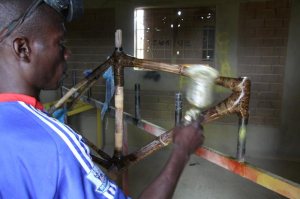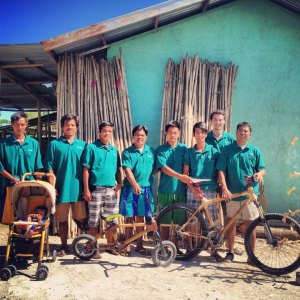A few weeks ago, I was in Ghana, one of the 18 Member states of INBAR in Africa, and the host of our Regional Office for West Africa. The INBAR office is in Kumasi, where we are sharing the premises with Tropenbos Ghana.

Michael Kwaku and Paul Osei Tutu – INBAR Office
The main reason for coming to Ghana was to speak at the workshop on “Innovative Management and Utilization for Bamboo Biomass in Agroforestry Systems”. The workshop presented results from INBAR’s work under the project: “Improving food security in Africa through increased system productivity from biomass-based value webs – BiomassWeb”.
The workshop was organized at the premises of the Forum for Agricultural Research in Africa (FARA) in Accra. FARA is an African institution, representing agricultural research in all of Africa. INBAR and FARA are discussing how to upscale cooperation to the continental level, and I hope I can write about this in the not too distant future.
The workshop was well attended and generated a lot of very frank and lively discussion about the need for market development, the lack of planting material, the challenges with inter-ministerial cooperation, and the fact that there is not enough understanding and awareness about bamboo and rattan in Ghana. We had representatives from the Ministry of Lands and Natural Resources, Ministry of Agriculture, the Ghana Bamboo and Rattan Development Programme (BARADEP), the Forestry Commission, the Forest Research Institute of Ghana (FORIG), the Ghana Alliance for Clean Cookstoves and the Embassy of China. The overwhelming recommendation was to organize a follow-up meeting next year, with a wider list of invitees, presence of the media, and more discussions about the challenges for development of a bamboo industry.
This involvement of the local private sector was one of the exciting aspects of my visit to Ghana, and I was able to talk with several local entrepreneurs and business people. In the workshop I met Janette Poku Akom from Kwamoka Farms and Processing Ltd . Kwamoka Farms is a bamboo agro-forestry business that produces bamboo seedlings and reforestation services. They state that their aim is to help in the reduction of deforestation through the promotion of wider use of bamboo as a renewable natural resource whilst contributing towards rural development and poverty reduction.

Janette Poku Akom and Gloria Asare Adu
During the workshop, I also had a long discussion with Gloria Asare Adu, the CEO of Global Bamboo Products Ltd Gloria has attended several INBAR training courses in China, and she worked with INBAR during the EC-funded charcoal project. As a result, she has launched her own bamboo charcoal manufacturing plant, and she is selling her charcoal for household consumption in the local supermarket in Accra.
Ghana is well known for the manufacturing of bamboo bicycles, especially after Bernice Dapaah, the CEO of Ghana Bamboo Bikes Initiative was profiled at the 2013 Conference of Parties of the Climate Change Convention. The photo of UN Secretary-General Ban Ki Moon on a bamboo bicycle went viral.

The Ghana Bamboo Bikes Initiative is a Ghanaian social enterprise that addresses youth unemployment by creating jobs for young people, especially women.
Bernice employs nearly 35 workers, and they manufacture high quality bamboo bicycles. She has good connections all over the world, and I was pleased to see one of her bamboo bikes in the reception of the Embassy of the Netherlands in Accra.
I last met Bernice during the 2015 World Bamboo Congress in Damyang, Korea. She is a World Bamboo Ambassador, and she is passionate about using bamboo to create jobs for local women. This time, we met at the INBAR Office in Kumasi, and she agreed to join me later this year to present her experiences during the Global Science, Technology and Innovation Congress (GSTIC2017) in Brussels, Belgium.
I also visited the workshop of the other bamboo bicycle manufacturer in Kumasi, Boomers international. Their workshop is a good 90 minutes’ drive outside Kumasi into the countryside. The CEO, Mr Kwabena Danso, was not on site, because he arrived back from UK that day, but I met him for dinner in Accra the following evening. Boomers is employing approximately 35 young man from the neighbouring villages, and they are manufacturing very nice looking bamboo frames.

The bamboo is harvested from nearby clumps, treated, sorted and used to make sturdy bamboo frames.  They told me that the main market for the frames is currently in Germany and the Netherlands, and the bikes are assembled there. I saw a large number of frames ready for dispatch, so business seems to be good, and Mr Danso confirmed that Boomers International is doing well.
They told me that the main market for the frames is currently in Germany and the Netherlands, and the bikes are assembled there. I saw a large number of frames ready for dispatch, so business seems to be good, and Mr Danso confirmed that Boomers International is doing well.
Back in Accra, I visited several of the bamboo and rattan furniture stalls in the centre of town. The furniture is manufactured and sold at the roadside, and there is a thriving business of local people who stop their car to have a look at the wares of display. Several of these local artisans were in China last year, during a three-month bamboo training programme which was organized by INBAR and the Chinese International Centre for Bamboo and Rattan (ICBR) with funding from the Ministry of Commerce of China. I had joined the students during the closing ceremony last November in southern China, and wished them good luck back home. It was therefore very nice to meet some of them again, but this time in Ghana.


The former students told me that they were doing well, and that business had improved significantly after their return from China. Apparently, customers specifically ask for the “Chinese students” when they visit the roadside markets, and the students told me that they had seen an improvement in their designs, their manufacturing process, and the finishing of the products. It was very encouraging for me to learn about this positive outcome, as I had asked myself if the training in China would have made a big difference. Clearly, it has made life and the living conditions of this group of furniture manufacturers a lot better.

One aspect that particularly bothers the artisans, is the fact that they have no electricity in their manufacturing space along the road side, and therefore they cannot use any equipment or machines. They also lack proper storage facilities, and during the rainy season all the new furniture gets wet. They want to move to a proper furniture market where they have better services, and they have asked the Bamboo and Rattan Development Programme (BARADEP) to help. The Ministry of Lands and Natural Resources, which is the host of BARADEP, has allocated land for such a common facility, and they are currently looking for funding to make it happen. I agreed to help find a solution.
It is clear that there is a keen interest to develop the bamboo resources in Ghana, and there is already a local market. Improved quality will make the local trade more lucrative, and an increased supply of bamboo will reduce the price of the raw material and consequently the price of the manufactured products.

The ministry of Lands and Natural Resources is planning a major national programme to reforest some of the areas that have been devastated by small scale mining, and this could include bamboo plantations. Such a large-scale intervention could be the game-changer that Ghana needs, and I have offered to work with the ministry to encourage the establishment of large-scale bamboo plantations







